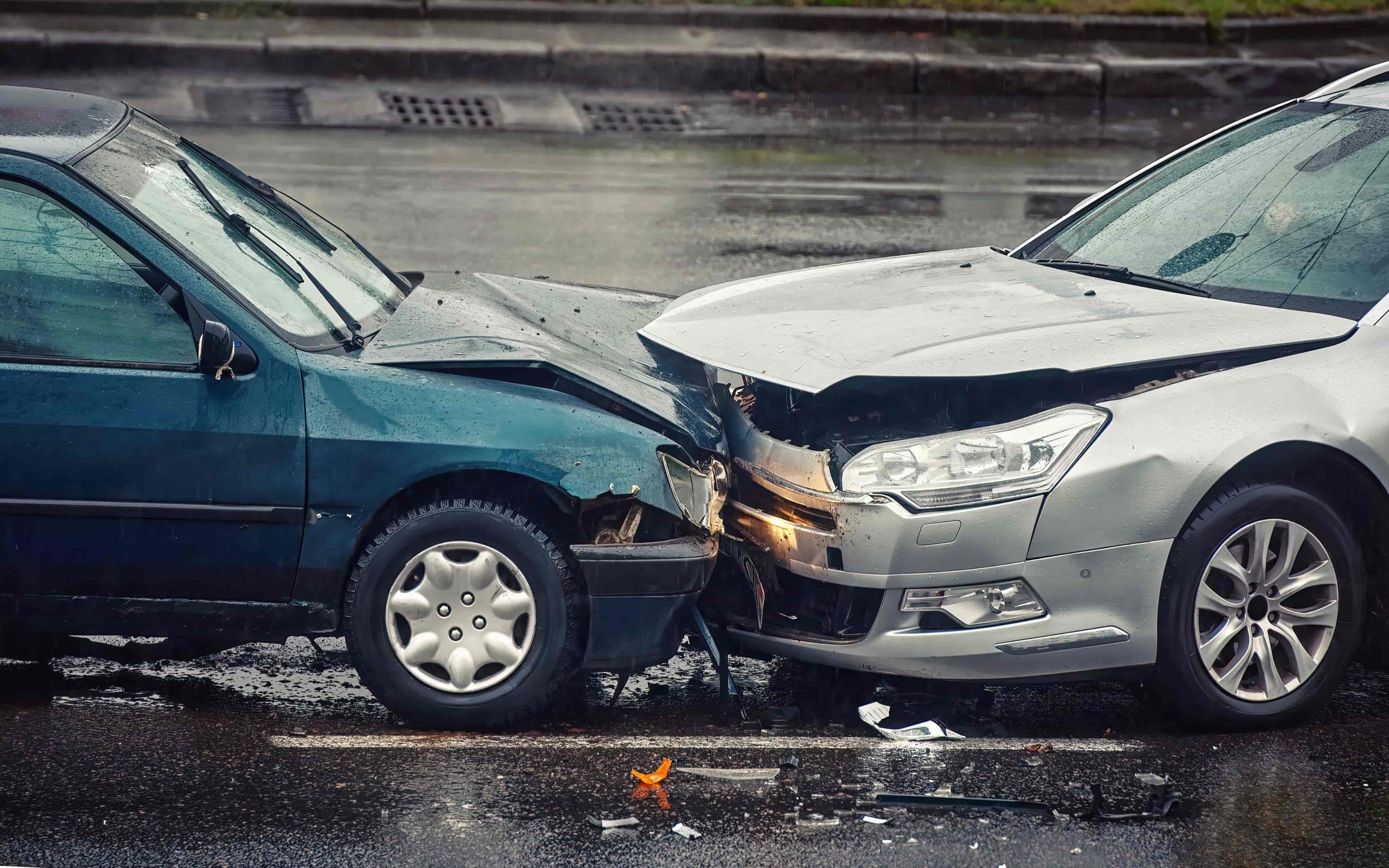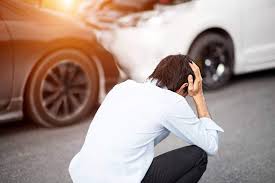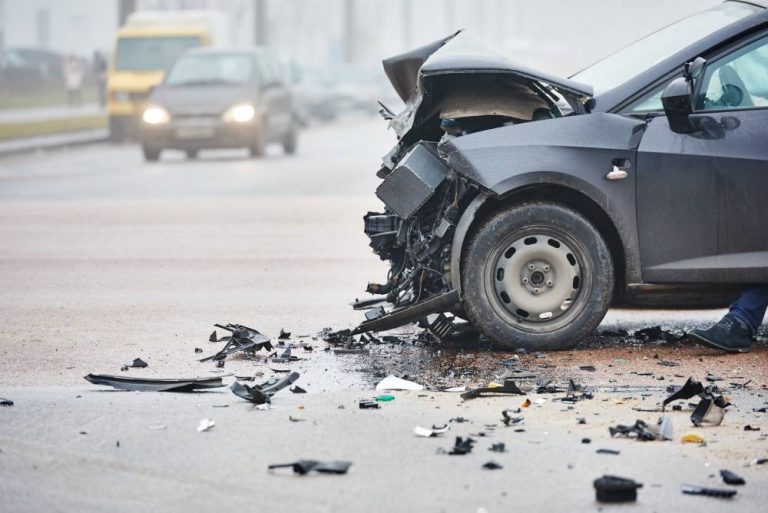The moments after a car accident are stressful and chaotic, but what you do next can have a major impact on your health, finances, and potential legal claims. Many people make critical mistakes—like admitting fault, not seeking medical attention right away, or accepting a lowball settlement from an insurance company.
Knowing exactly what steps to take can:
- Protect your rights when dealing with insurance companies.
- Ensure you receive proper medical care (even if injuries don’t seem serious at first).
- Help you get the compensation you deserve for medical bills, lost wages, and pain and suffering.
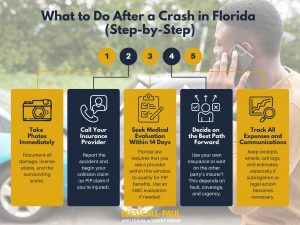
That’s why we’ve created this step-by-step guide—to help Florida drivers navigate the aftermath of a car accident and avoid costly mistakes. Whether you were hit by a distracted driver in Miami or involved in a rear-end collision on I-95, this guide will ensure you take the right steps to protect yourself.
Let’s get started.
Step 1: Stay Safe and Immediately Call 911
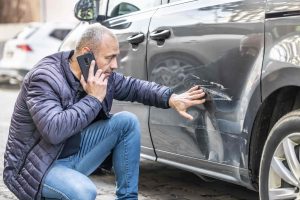
The moments immediately following a car accident can be disorienting and overwhelming, but your first priority should always be safety—both for yourself and others involved. Taking the right actions at the scene can prevent further injuries, ensure proper medical care, and protect your legal rights.
Move to a Safe Area If Possible
If your accident occurs in the middle of traffic, stay calm and assess whether you can safely move your vehicle to the shoulder of the road, a nearby parking lot, or a less congested area. This helps:
- Reduce the risk of secondary accidents.
- Prevent traffic congestion and road hazards.
- Make it easier for first responders to reach you.
⚠️ When NOT to move your car:
- If someone is seriously injured.
- If moving the car might cause more damage or obstruct an investigation.
- If law enforcement advises against it.
If your vehicle cannot be moved, turn on your hazard lights and, if available, set up emergency flares or warning triangles to alert other drivers.
Check for Injuries
Before worrying about vehicle damage or insurance details, check yourself and your passengers for injuries. Even if you feel fine, adrenaline can mask pain, and some injuries (like whiplash or internal bleeding) may not be immediately apparent.
- Ask passengers if they’re okay and look for visible signs of injury (bleeding, bruising, difficulty breathing).
- If anyone is unconscious, bleeding heavily, or in severe pain, DO NOT attempt to move them unless there’s an immediate danger (such as a fire).
- If you’re experiencing dizziness, neck pain, or confusion, stay seated and wait for paramedics to evaluate you.
🚨 Important: Florida law requires accident victims to seek medical treatment within 14 days to qualify for Personal Injury Protection (PIP) benefits. Even if you don’t feel hurt at the scene, getting evaluated by a doctor as soon as possible is crucial.
Call 911 for Police and Medical Assistance
In Florida, you are legally required to report an accident if:
- Someone is injured or killed.
- There is $500 or more in vehicle or property damage
🔴 DO NOT
- Drive away before law enforcement arrives (unless you’re in immediate danger).
- Assume it’s “just a fender bender” and skip calling 911.
- Admit fault or apologize—it can be used against you in insurance claims.
- Ignore hidden injuries—some injuries take hours or days to appear.
💡 Pro Tip: If the police do not respond (which can happen in minor accidents), you may be required to file a Driver Report of Traffic Crash online through the Florida Highway Safety and Motor Vehicles (FLHSMV) website.
Step 2: Document the Accident Scene
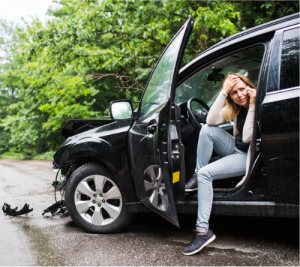
After ensuring safety and calling 911, the next crucial step is documenting the accident scene. The evidence you collect can make or break your insurance claim and protect you in case of legal disputes. Many drivers make the mistake of assuming police reports or insurance adjusters will handle everything, but firsthand documentation is key to ensuring the facts are accurately represented.
Take Photos and Videos of Vehicles, Injuries, and Surroundings
Visual evidence is one of the strongest tools in proving what happened in an accident. Use your smartphone to capture clear, high-quality images from multiple angles.
📸 What To Photograph
✔ Vehicle damage – Take pictures of all vehicles involved, including close-ups of dents, scratches, and shattered glass.
✔ License plates – Capture clear images of all involved vehicles’ license plates.
✔ Injuries – If safe, document any visible injuries (bruises, cuts, swelling) for medical and legal records.
✔ Road conditions – Skid marks, potholes, construction zones, or debris that may have contributed to the crash.
✔ Traffic signals and signs – Stop signs, traffic lights, yield signs, and speed limit indicators near the accident scene.
✔ Weather conditions – If it was raining, foggy, or dark, make sure to capture that to explain visibility concerns.
✔ Surroundings – Nearby businesses, homes, or surveillance cameras that may have recorded the crash.
🎥 Bonus tip: Record a video walkthrough of the scene, narrating what happened while showing vehicle positions, damages, and road conditions. This can provide additional context that static photos may not capture.
Gather Witness Information
If any bystanders saw the accident, their testimony can be crucial in proving fault—especially if the other driver tries to change their story.
👥 Ask Witnesses For
✔ Full name
✔ Phone number
✔ Email address
✔ A brief description of what they saw
Witness statements can be particularly helpful in hit-and-run cases or if the at-fault driver denies responsibility. If possible, ask witnesses to record a quick statement on your phone while their memory is fresh.
🚨 Key tip: If the accident occurred near a business or intersection, check for security cameras that may have captured footage. Store owners or managers might be willing to provide it, but act fast—many security systems automatically overwrite footage in a few days.
Do Not Admit Fault or Apologize
One of the biggest mistakes accident victims make is apologizing at the scene—even if they weren’t at fault. Insurance companies and attorneys can use your words against you to reduce or deny your compensation.
🚫 Avoid saying things like
❌ “I’m so sorry, I didn’t see you.”
❌ “I should have stopped sooner.”
❌ “I wasn’t paying attention.”
❌ “It was my fault.”
I know this probably goes against every instinct in your body. But even a simple “I’m sorry” can be misinterpreted as an admission of guilt, making it harder to prove your case later. Instead, keep your statements factual and neutral.
✅ What to say instead:
✔ “Are you okay?” (Shows concern without admitting fault)
✔ “We should exchange information and wait for the police.”
✔ “Let’s let the insurance companies handle this.”
💡 Important: Florida follows a comparative negligence system, meaning fault can be shared. Even if you were partially responsible, admitting guilt at the scene can reduce your potential compensation.
Step 3: Exchange Information with Other Drivers
Are you and everyone else involved safe? Did you document the accident scene? The next critical step is exchanging information with the other driver(s) involved. The details you collect will be crucial for filing an insurance claim, proving liability, and protecting yourself legally.
However, tensions can run high, so it’s important to stay calm and handle the situation carefully.
What Information to Collect
To streamline the claims process and avoid complications, gather the following details from the other driver:
📌 Driver’s Information
✔ Full name
✔ Phone number
✔ Home address
✔ Driver’s license number
📌 Vehicle Information
✔ Make, model, and year of the car
✔ License plate number
✔ Vehicle Identification Number (VIN) (if possible)
📌 Insurance Information
✔ Name of the insurance company
✔ Policy number
✔ Insurance company’s contact details
📌 Other Important Details
✔ Exact location of the accident
✔ Names and contact information of any passengers
✔ Names and badge numbers of responding police officers
📸 Tip: Instead of writing everything down, take clear photos of the driver’s license, insurance card, and license plate.
🚨 Key Reminder: If the other driver refuses to provide their insurance information, Florida law allows you to request it from law enforcement if they arrive at the scene.
What If the Other Driver Is Uninsured?
Despite Florida requiring drivers to carry Personal Injury Protection (PIP) coverage, many still drive without insurance. If you’re hit by an uninsured driver, you still have options:
- Step 1: Call the Police – An official police report will be essential for filing a claim through your own insurance.
- Step 2: Check Your Own Coverage – If you have:
- Uninsured Motorist (UM) Coverage – Your insurance will cover medical expenses, lost wages, and damages.
- Collision Coverage – Your own insurance may cover vehicle repairs, minus your deductible.
- Step 3: Consider Legal Action – If your damages exceed coverage limits, you may need to file a lawsuit against the uninsured driver.
🚨 Key Tip: Uninsured drivers may try to settle the accident privately to avoid penalties. Be cautious—without an official record, they may later deny responsibility or refuse payment. Always document the scene and contact your insurance provider immediately.
Step 4: Seek Immediate Medical Attention
Even if you feel fine after an accident, it’s crucial to seek medical attention as soon as possible. Many injuries, such as whiplash, concussions, or internal bleeding, don’t present symptoms right away. Failing to get checked out can not only put your health at risk but may also jeopardize your ability to receive compensation under Florida’s insurance laws.
Florida’s 14-Day Accident Law
Florida law requires all car accident victims to seek medical treatment within 14 days of an accident to qualify for Personal Injury Protection (PIP) benefits. This is known as the 14-Day Rule.
🚨 If you miss the 14-day window, your insurance company can deny your claim—leaving you responsible for medical bills.
🔵 Who qualifies for PIP benefits?
- You must have sought treatment within 14 days of the crash.
- Treatment must be from a licensed medical professional, such as a doctor, hospital, chiropractor, or urgent care center.
🔵 What if my injuries seem minor?
- Even soft tissue injuries (like neck and back pain) can worsen over time.
- Some injuries may not show symptoms until days or weeks later.
- Getting checked early ensures documentation for insurance claims.
💡 Key Tip: If you see a doctor outside the 14-day window, you may still be able to file a personal injury claim, but you will not be eligible for PIP benefits.
📞 Pro Tip: Applebaum Accident Group can connect you with trusted medical professionals who specialize in car accident injuries and will document everything properly to protect your case.
Hidden Injuries to Watch Out For
Many injuries don’t appear immediately after an accident due to adrenaline and shock. Some common delayed symptoms include:
🔴 Head and Brain Injuries
- Concussions (dizziness, nausea, headaches)
- Traumatic Brain Injuries (TBIs) (memory loss, confusion, vision issues)
Helpful Resource: Average Concussion Car Accident Settlement in Florida
🔴 Soft Tissue Injuries
- Whiplash (neck stiffness, headaches, tingling in arms)
- Muscle sprains and strains (back pain, shoulder pain)
🔴 Internal Injuries
- Internal bleeding (abdominal pain, deep bruising)
- Organ damage (shortness of breath, weakness, fainting)
🔴 Psychological Trauma
- PTSD or anxiety (trouble sleeping, flashbacks, mood swings)
🚨 Warning: If you develop any new pain, dizziness, numbness, or vision problems in the days after an accident, see a doctor immediately. Delaying treatment can harm your health and weaken your injury claim.
Step 5: File a Police Report
Filing a police report is one of the most important steps after a car accident. Even if the accident seems minor, having an official record can protect you from liability disputes and ensure your insurance claim is properly documented. Insurance companies rely heavily on police reports when determining fault, so skipping this step could weaken your claim.
When It’s Required by Law
Under Florida law (Section 316.065, Florida Statutes), you must report an accident to law enforcement if:
✔ The crash results in injuries or fatalities (even minor injuries).
✔ The crash causes at least $500 in vehicle or property damage.
✔ A vehicle is undrivable and requires towing.
✔ The accident involves a hit-and-run or DUI.
🚨 Failure to report an accident in these situations can result in penalties, including fines and license suspension.
Even if your accident doesn’t meet the legal requirement, it’s still a good idea to file a report—especially if the other driver is at fault, uninsured, or behaving suspiciously.
How to Obtain a Copy of the Report
After law enforcement files the report, you’ll need to get a copy for your insurance claim and potential legal case.
🔵 Ways To Obtain Your Police Report
1️⃣ Online: Available through the Florida Crash Portal —reports are usually available within 10 days.
2️⃣ In-Person: Visit the local police department or Florida Highway Patrol (FHP) office where the report was filed.
3️⃣ By Mail: You can request a copy by mailing a written request to the Florida Department of Highway Safety and Motor Vehicles (FLHSMV).
📌 Pro Tip: Police reports are usually free for accident victims if requested within 60 days. After that, you may have to pay a small fee.
What to Do If Police Don’t Come to the Scene
In some cases, police may not respond to the accident—especially if it’s a minor fender-bender with no injuries. If that happens, you’re still responsible for reporting the crash.
🔵 Steps to take if police don’t arrive
✔ File a Driver Report of Traffic Crash online through the Florida Highway Safety and Motor Vehicles (FLHSMV) website (flhsmv.gov).
✔ Gather as much evidence as possible—take photos, get witness statements, and exchange information with the other driver.
✔ Notify your insurance company immediately and provide them with your documentation.
🚨 Why it’s important: Without an official police report, insurance companies may deny or reduce your claim, arguing there’s no proof of the accident. Filing a self-report ensures there’s a legal record of what happened.
Step 6: Notify Your Insurance Company
Once you’ve ensured safety, documented the scene, and filed a police report, the next critical step is notifying your insurance company. Reporting the accident quickly ensures that your claim is processed smoothly and prevents potential disputes over coverage.
However, it’s important to know what to say (and what NOT to say) when dealing with insurance adjusters.
Timeframe for Reporting the Accident
Most insurance companies require you to report an accident within 24 to 72 hours. However, specific deadlines vary depending on your policy.
🔵 Florida’s key insurance deadlines
✔ Personal Injury Protection (PIP) claims – You must seek medical attention within 14 days to qualify for PIP benefits.
✔ Property damage claims – Insurance policies typically require reporting within a few days, but each company has its own rules.
✔ Bodily injury lawsuits – You generally have four years from the date of the accident to file a lawsuit against the at-fault party.
🚨 Failure to report the accident in time could result in claim denial. Always check your policy’s specific requirements.
What Information to Provide
When calling your insurance company, stick to basic facts and avoid making assumptions about fault or injuries.
📌 Essential Details To Provide
✔ Date, time, and location of the accident
✔ Names and contact details of all involved parties
✔ Insurance information of the other driver(s)
✔ Police report number (if available)
✔ Photos and videos of the accident scene
✔ Names of any witnesses
💡 Key Tip: If you’re unsure about the extent of your injuries, do not say “I’m fine.” Some injuries, like whiplash, take days to appear. Instead, say, “I am seeking medical evaluation.”
Insurance Adjusters Are Sneaky, Avoid These Mistakes
Insurance companies are not on your side—they’re focused on minimizing payouts. When speaking to adjusters, be careful not to say anything that could harm your claim.
❌ Admitting fault – Even saying “I’m sorry” can be used against you.
❌ Speculating about injuries – Some injuries take time to develop, so don’t downplay symptoms.
❌ Giving a recorded statement too soon – Insurance adjusters may pressure you to give a recorded statement, which could be used to reduce your payout. You are not legally required to provide one.
❌ Accepting a lowball settlement too quickly – If an adjuster offers a quick payout, it’s often far less than what you deserve.
💡 Key Tip: If the insurance company asks for a statement, politely decline and say, “I would like to speak with my attorney first.”
How Long Do I Have to File a Claim in Florida?
Florida has different time limits depending on the type of claim:
- PIP claims: You must seek medical treatment within 14 days, but insurance claims should be filed as soon as possible.
- Property damage claims: Most insurance companies require filing within 30 days (but check your specific policy).
- Personal injury lawsuits: You have four years from the accident date to file a claim against the at-fault driver.
- Wrongful death claims: If the accident resulted in a fatality, the statute of limitations is two years from the date of death.
🚨 Missed deadlines can mean losing out on compensation, so act fast.
Step 8: Consider Consulting a Car Accident Attorney
While not every car accident requires an attorney, certain situations make legal representation essential to ensure you receive the full compensation you deserve. Insurance companies are in the business of minimizing payouts, and without an experienced lawyer on your side, you may not get the settlement you’re entitled to.
When to Seek Legal Representation
You should strongly consider hiring a car accident attorney if:
✔ Your injuries are serious or long-term – If your accident resulted in significant injuries, permanent disability, or long-term medical care, an attorney can help ensure you receive compensation for ongoing medical expenses, lost income, and pain and suffering.
✔ The insurance company is denying or delaying your claim – Insurers often use delay tactics, deny valid claims, or offer lowball settlements. A lawyer can negotiate on your behalf and hold them accountable.
✔ You were partially at fault – Under Florida’s comparative negligence law, your compensation may be reduced if you’re found partially responsible. A lawyer can help limit how much fault is assigned to you to maximize your payout.
✔ The accident involved a commercial vehicle, rideshare, or government entity – Cases involving trucking companies, Uber/Lyft, or city/state vehicles can be complex. An attorney can navigate these specialized claims.
✔ You are experiencing financial stress due to medical bills and lost wages – An attorney can help you recover lost income, medical expenses, and damages beyond what PIP insurance covers.
Step 9: Be Cautious with Social Media
In today’s digital world, social media can make or break your personal injury claim. Many accident victims unknowingly hurt their cases by posting updates, photos, or comments that insurance companies and defense lawyers can use against them.
Even if your settings are private, assume that everything you post can be accessed and misinterpreted.
🚨 How social media can hurt your case:
- Contradicting your injuries – If you claim severe pain but post a photo at the gym, insurers will argue you’re exaggerating.
- Downplaying your injuries – Even a simple “I’m fine” comment can be taken as proof that your injuries aren’t serious.
- Proving fault against you – A harmless joke like “Oops, I didn’t see that car coming!” can be used to assign partial blame.
- Challenging lost wages claims – Posting vacation photos or nights out could make it seem like you’re not suffering financially.
📌 Key Tip: Insurance companies don’t need your permission to access public posts, and even private posts can be subpoenaed in court.
Step 10: Follow Up on Your Claim
Filing an insurance claim is just the first step in getting the compensation you deserve. Many accident victims assume their insurance company will handle everything fairly, but insurers prioritize their bottom line—not your best interests. Knowing how to track your claim, negotiate effectively, and escalate when necessary can help ensure you receive the maximum compensation.
The Claims Process
The auto accident claims process in Florida typically follows these steps:
1️⃣ File the claim – Notify your insurance company within 24 to 72 hours after the accident. Provide basic details (date, location, police report, photos) but avoid making statements about fault or injuries too early.
2️⃣ Insurance investigation begins – The insurer will assign an adjuster to review your claim. They may:
- Request additional documents (medical records, repair estimates, witness statements).
- Ask for a recorded statement (you are not required to provide this—consult an attorney first).
- Evaluate fault and damages using the police report and evidence.
3️⃣ Settlement offer – If the insurance company accepts liability, they will make an initial settlement offer.
- Be cautious—this offer is usually much lower than what you actually deserve.
- If your injuries are serious, consult an attorney before accepting any offer.
4️⃣ Negotiation and counteroffers – You can reject the first offer and negotiate for a fair payout. This may involve:
- Providing additional medical evidence.
- Demonstrating how the injury impacts your daily life and ability to work.
5️⃣ Claim resolution or legal escalation – If the insurer refuses to offer a fair settlement, you may need to:
- File a formal complaint with the Florida Department of Financial Services.
- Take legal action by filing a personal injury lawsuit.
📌 Key Tip: Keep a detailed log of every conversation and email with the insurance company to track your claim’s progress.
Negotiating with Insurance Companies
Insurance companies often use tactics to minimize payouts. Here’s how to counter their strategies:
🚨 Common insurance tactics & how to respond:
❌ Lowball settlements – Adjusters may offer a quick payout, hoping you’ll accept less than you deserve.
✔ Counter with evidence – Provide detailed medical records, lost wages, and long-term care estimates.
❌ Delaying the process – Insurers may stall to pressure you into accepting a low offer.
✔ Set deadlines – Politely demand a response within a reasonable timeframe (e.g., 14 days).
❌ Blaming pre-existing conditions – They may argue your injuries existed before the accident.
✔ Medical documentation is key – A doctor’s statement linking your injuries to the accident can refute this claim.
❌ Denying liability – They may say you were partially or fully at fault to reduce your payout.
✔ Use police reports and witness statements – These can establish who was truly at fault.
📌 Key Tip: Never accept the first offer. Insurance companies expect negotiations, so be prepared to push back.
How Much Compensation Can I Expect for My Injuries?
The value of your claim depends on several factors, including the severity of injuries, fault percentage, and financial losses.
💰 Potential damages you can recover:
✔ Medical Expenses – Covers hospital bills, physical therapy, prescription meds, and future treatments.
✔ Lost Wages – Compensation for time missed from work due to the accident.
✔ Pain and Suffering – For emotional distress, physical pain, PTSD, and reduced quality of life.
✔ Property Damage – Cost of repairing or replacing your vehicle.
✔ Loss of Earning Capacity – If injuries prevent you from returning to work or force a career change.
✔ Punitive Damages – Awarded in severe cases (e.g., DUI-related accidents).
🔵 Average car accident settlements in Florida:
- Soft tissue injuries (whiplash, minor sprains) – $10,000–$25,000
- Moderate injuries (broken bones, concussions) – $50,000–$200,000
- Severe injuries (spinal cord injuries, brain trauma) – $500,000+
🚨 Key Tip: The insurance company’s first offer is rarely the best one. If you suffered serious injuries, consulting an attorney can help you fight for the full compensation you deserve.
Protect Your Rights and Get the Help You Deserve
Navigating the aftermath of a car accident can be overwhelming, but taking the right steps ensures you protect your health, finances, and legal rights. From securing medical treatment and documenting evidence to negotiating with insurance companies and considering legal action, every decision you make plays a role in the outcome of your claim.
But you don’t have to handle it alone. Insurance companies have teams of adjusters and lawyers working to minimize your payout—shouldn’t you have experts fighting for you, too?
At Applebaum Accident Group, we make the process simple and stress-free by connecting you with top-rated attorneys and medical professionals who will fight for the compensation you deserve. Whether you’re dealing with serious injuries, denied claims, or an unfair settlement offer, we can match you with the right legal and medical team to protect your rights.
📞 Don’t wait—call 855-CALL-PAUL today for a free consultation. Let us help you take the next step toward justice, recovery, and the maximum compensation you’re entitled to.

